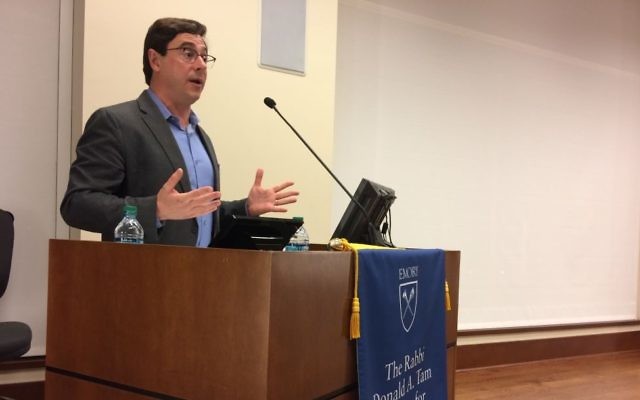Criticism of Israel Divides Jewish America
According to Dov Waxman millennials are becoming more ambivalent toward Israels policies.
The rock-solid, shoulder-to-shoulder relationship between the American Jewish community and Israel is not what it was and likely will never be again.
That’s the conclusion of Dov Waxman, a prominent scholar of that relationship, who delivered this year’s Rothschild Memorial Lecture at Emory University.
In a wide-ranging and critical examination of how American Jews see Israel today, Waxman, who leads the Jewish studies and Israel studies programs at Northeastern University in Boston, said, “The age of unquestioning and uncritical American Jewish support for Israel is over.”
While support for the Jewish state remains strong, he said, “growing numbers of American Jews are becoming more ambivalent and more critical of Israel government policies.”
That critical view is prevalent among younger generations of American Jews. They did not experience Israel’s early formative years, during which the American Jewish imagination was shaped by the success of Leon Uris’ novel “Exodus” and the subsequent film in 1960.
Many Jews under 45, particularly those under 30, no longer see Israel as the tiny David struggling against the Arab Goliath. They view Israel in the light of the peace treaty it signed with Egypt in 1979 and its growing commercial ties in the Middle East, so that Israel is the Goliath and the Palestinians are the diminutive David.
Younger Jews have, Waxman said, “only grown up with Israel as a focus of controversy, as a military power, as an occupier, as a source not of pride, the pride of their parents or grandparents, but rather as something of discomfort, unease, even a source of shame.”
In short, younger Jews look at Israel and “see a a different kind of country than their parents or grandparents did.”
That situation is creating major turmoil in Jewish communal organizations. “It is harder and harder,” Waxman said, “for the major Jewish organizations to represent a community consensus because that consensus is disappearing.”
In terms of energizing a broad-based constituency and a creating a diverse donor base, life is becoming ever more difficult for those national organizations. Many increasingly rely on a smaller number of wealthy and sometimes politically conservative donors.
The result, Waxman said, is that “it is harder for these organization to find a constituency. They face attacks from both left and right and are accused of being unrepresentative and out of touch.
“Consequently, there is a growing split, a very ugly uncivil argument, happening in the American Jewish community today. It is leading to bigger arguments between members of the same synagogue. It is discouraging rabbis from talking about Israel altogether, in case they create an argument and lose their jobs.”
Waxman said Jewish community centers are avoiding controversial speakers and Israel events that could become controversial. “It is frightening many Jews away from talking about Israel altogether.”
The divide is significant between the Orthodox community, which is increasingly conservative politically, and Jews who are liberal in their political and religious beliefs.
In his recent book, “Trouble in the Tribe: The American Jewish Conflict Over Israel,” Waxman devotes a chapter to the polarization of American Jewry. The split between Orthodox and non-Orthodox is over several issues, not just Israel.
“There is a major divide in the American Jewish community between religious conservative and secular liberals. … The polarization poses a severe challenge to the future cohesion of the American Jewish community,” Waxman wrote.
Some American Jews are shifting their concerns from Israel’s future to the political future of America.
In a lunchtime talk on the Emory campus the day of the Rothschild Memorial Lecture, Waxman described a growing Jewish backlash to the policies of the Trump administration.
“The response by certain elements in the American Jewish community has been an outpouring of grassroots political activism and political organizing … whether it is synagogues, community groups, local organizations or individuals engaged politically as Jews or, as it is sometimes referred to, the Jewish resistance to the Trump agenda,” he said.
America’s Jews are divided over the way each sees the modern world and their place in it. As Waxman said, “Liberal democracy no longer is seen as stable or as unassailable as it once was. This challenges the core assumptions of American Jewish identity.”




comments